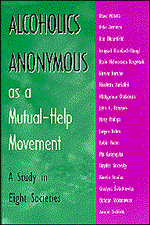The University of Wisconsin Press
Health / Recovery / Sociology / Psychology
|
Alcoholics
Anonymous as a Mutual-Help Movement
"Indispensable
for anyone trying to understand AA at the end of the twentieth
century."—Harry
G. Levine, Queens College, City University of New York The authors look at what actually happens in an AA meeting, how members interact, and how the AA model fits into widely varying cultural traditions. The book includes the early history of AA and its organizational principles, its international growth, and its present structure, finances, and membership. The chapters pay particular attention to the relationships of belief and action in AA, the role of written and oral tradition in the transmission of the beliefs, and cultural variations in the content of the belief system. Because AA is a mutual-help movement, the authors contrast it with professional health care of various kinds, including 12-step programs, and compare it with alternative mutual-aid organizations. The book draws on an abundance of data, including surveys, observation, in-depth talks with members, and a wealth of unpublished documents pertaining to AA in Austria, Finland, Iceland, Mexico, Poland, Sweden, Switzerland, and the United States. The authors analyze AA's organizational guidelines as an innovative code of principles for non-hierarchic and non-bureaucratic social structures, and suggest that AA is the prototype for an emerging social form. The authors are: Klaus Mäkelä, Ilkka Arminen, Kim Bloomfield, Irmgard Eisenbach-Stangl, Karin Helmersson Bergmark, Noriko Kurube, Nicoletta Mariolini, Hildigunnur Ólafsdóttir, John H. Peterson, Mary Phillips, Jürgen Rehm, Robin Room, Pia Rosenqvist, Haydée Rosovsky, Kerstin Stenius, Grazyna Swiatkiewicz, Bohdan Woronowicz, and Antoni Zielínski. They are affiliated with university sociology & social work departments, institutes studying addiction, and medical and psychiatric units of clinics and hospitals. They work in England, Germany, Austria, Sweden, the United States, Finland, Iceland, Canada, Mexico, and Poland.
Media & bookseller inquiries regarding review copies, events, and interviews can be directed to the publicity department at publicity@wwwtest.uwpress.wisc.edu or (608) 263-0734. (If you want to examine a book for possible course use, please see our Course Books page. If you want to examine a book for possible rights licensing, please see Rights & Permissions.) |
|
|||||||||
|
|
If you have trouble accessing
any page in this web site, contact our Web manager. Updated 3/18/2014 © 2011, The Board of Regents of the University of Wisconsin System |
